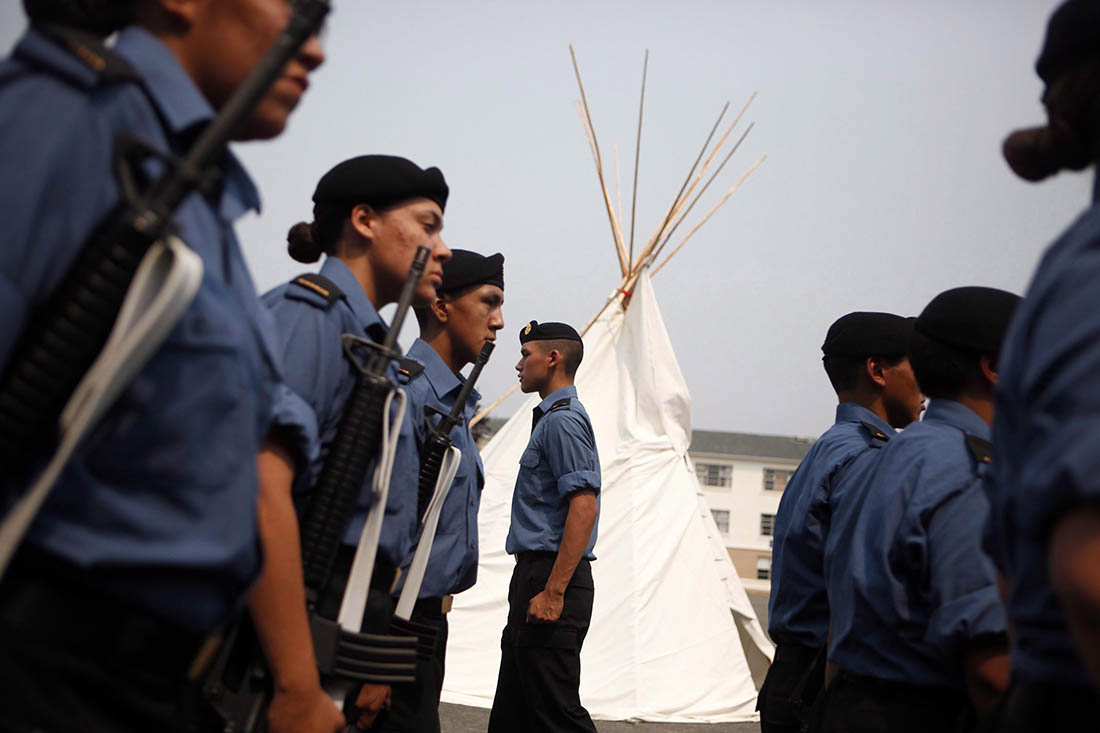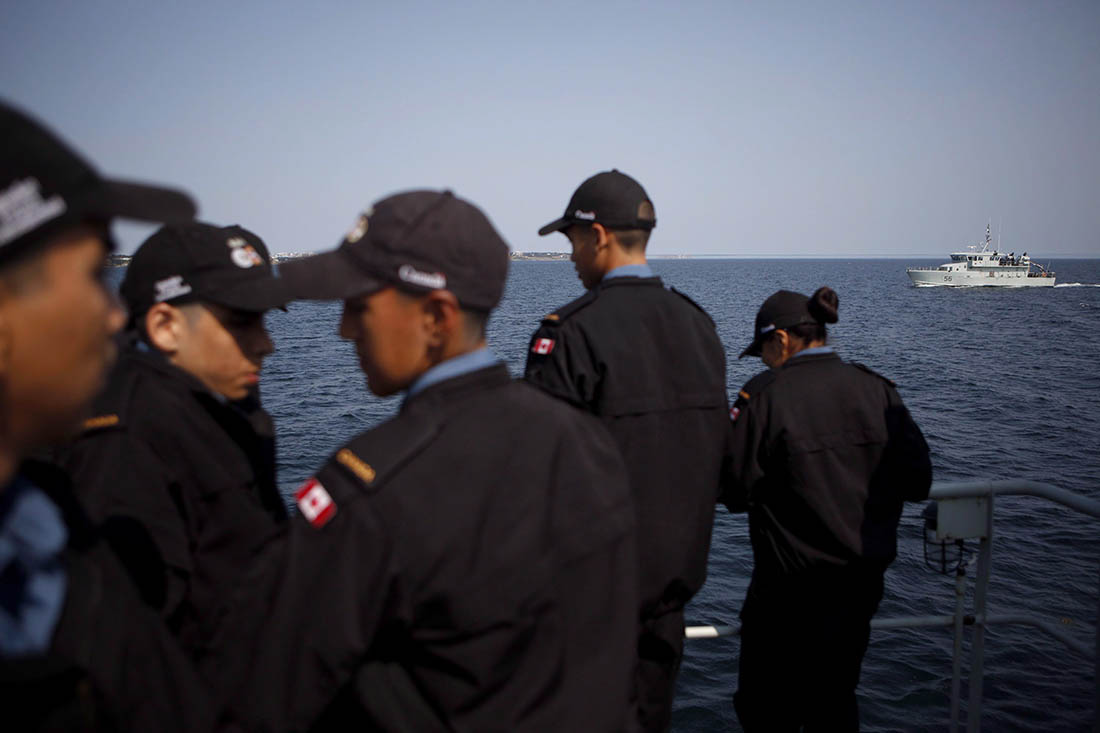Indigenous peoples in Canada have a long history of service to the military, stretching back to French and British colonial days. Since Confederation in 1867, First Nations, Inuit and Métis members have continued the military tradition of their forebears and served in all branches of the armed forces. They have done this despite frequently facing exclusion and discrimination.
Indigenous people account for approximately 5 per cent of Canada’s population. Figures from the Department of National Defence as of December 2024 note that 3 per cent of the Regular Force and Primary Reserve members of the Canadian Armed Forces (CAF) self-identified as Indigenous. This number does not include the Canadian Rangers, which report 27.2 per cent Indigenous members. However, some argue the actual number of Indigenous members of the CAF may be higher than reported, particularly in the Canadian Rangers.

Background
In 1989, the CAF established Bold Eagle, the first of its Indigenous programs, in partnership with Indigenous communities. Not only did it have a positive impact on the socio-economic conditions of those who participated, but it also created a meaningful connection between the communities and the CAF. Building on this success, the CAF went on to develop six additional programs for Indigenous peoples.
Content
The aims of the CAF’s seven programs for Indigenous peoples are to provide Indigenous people in Canada with the opportunity for significant employment and an exposure to their cultural and traditional activities. Additionally, the programs provide training to prepare Indigenous applicants for careers in the CAF or elsewhere or to pursue higher education.
Summer Programs
Of the seven CAF programs for Indigenous peoples, five are summer programs. These programs are Bold Eagle, Raven, Black Bear, Carcajou (Wolverine) and Grey Wolf. The programs are six to eight weeks long and take place from early July to late August, with slight variations due to staff and facilities availability. The programs begin with an Indigenous cultures camp taught by Elders from various communities that lasts between three days and one week. Indigenous cultural aspects include a sweat lodge, powwows and a sharing circle, which occur at various times during the training.
All participants are enrolled in the Primary Reserve and take the same Basic Military Qualification course as other members of the Primary Reserve (see also Reserve Force of Canada). This includes physical fitness, weapons handling, military knowledge, map and compass navigation, first aid and leadership. On successful completion, graduates receive the Basic Military Qualification.
During each program, participants are provided with transportation to and from their home communities, meals and accommodation, all military clothing and equipment while on the course, and a minimum salary of about $4,200, more for longer courses.
Successful graduates can choose to transfer to a Primary Reserve unit near their homes, or to the Regular Force, or to the Canadian Rangers, or take their release. The Canadian Army conducts all programs except for Raven, which the Royal Canadian Navy runs. As of February 2025, the Royal Canadian Air Force does not conduct any similar program.
Requirements
To be accepted into one of the summer programs, participants must be a Canadian citizen and First Nation, Métis or Inuit. Applicants must be physically fit and not in conflict with the law at the time they apply.
They must also have completed Grade 10 and be at least 16 years old. Applicants under 18 years of age must have a parent’s or legal guardian’s consent and be enrolled in school full-time when they apply. Students who are completing Grade 10 can also take part, but they must have a letter from their school that outlines the courses they are taking and their ability to complete them successfully.
Bold Eagle
Bold Eagle was the first Indigenous summer program. It began in 1989 in Saskatchewan as a local initiative between the Prince Albert Tribal Council (now the Prince Albert Grand Council) and the CAF. In 2000, the CAF expanded Bold Eagle to include Indigenous peoples living in all of Western Canada and northwestern Ontario and now includes Northern Canada. Training takes place annually at 3rd Canadian Division Training Centre in Wainwright, Alberta.
Raven
Raven was established in 2003 and is oriented towards naval training. The Naval Fleet School Pacific at CFB Esquimalt, the Royal Canadian Navy base on Vancouver Island in British Columbia, conducts the training. Raven lasts for six weeks from early July to mid-August. During training, candidates from across Canada spend a day at sea aboard a Royal Canadian Navy ship, where they experience life at sea. This includes an introduction to firefighting, flood containment and damage control principles. Raven has a maximum of 50 participants.

Black Bear
Black Bear began in 2008 at CFB Borden, Ontario, but moved to Atlantic Canada in 2013. It accepts candidates not only from the Atlantic Provinces, but from across the rest of Canada as well. Black Bear is conducted for six weeks from the first week of July to mid-August at 5th Canadian Division Training Centre in Gagetown, New Brunswick.
Carcajou (Wolverine)
Carcajou began in 2018 as a French-only program, but it quickly became partially bilingual when it attracted anglophone candidates from Quebec and the rest of Canada. It is held at 2nd Canadian Division Training Centre in Valcartier, Quebec.
Grey Wolf
Grey Wolf began in 2019 and is intended for Indigenous people from across Ontario, less the northwestern part of the province. It is conducted at 4th Canadian Division Training Centre in Meaford, Ontario.
Indigenous Entry Program
The Canadian Armed Forces Indigenous Entry Program (CAFIEP) gives individuals considering a military career three weeks of experience in military life before making a decision, without having to enroll in the CAF. It is offered in French at the Canadian Forces Leadership and Recruit School in Saint-Jean-sur-Richelieu, Quebec, and in English at CFB Halifax, Nova Scotia.
Indigenous Leadership Opportunity Year
The Indigenous Leadership Opportunity Year (ILOY) offers a full academic year at the Royal Military College (RMC) of Canada, Kingston, Ontario. Participants are enrolled in the CAF as officer cadets and are paid. On successful completion, they can apply to continue at RMC, join the CAF as a non-commissioned member or be released.

 Share on Facebook
Share on Facebook Share on X
Share on X Share by Email
Share by Email Share on Google Classroom
Share on Google Classroom




